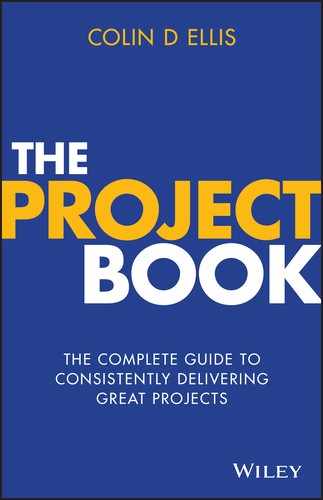CHAPTER 72
METHODS NEED TO BE UNDERSTOOD
If there’s one thing we’re good at in project management, it’s confusing the hell out of people with terminology about methods. It has become a disease and it needs to be eradicated. Too often I hear (and see on social media) arguments about which one is best, how someone is applying it wrongly or why all projects are doomed if they use or don’t use a particular method.
It’s so unhelpful and, frankly, boring. What these method martyrs have lost sight of is the fact that in project management it’s our job to deliver a product that satisfies a customer need and allows them to get the value they expect for their investment. Some 99.9 per cent of the time, the customer doesn’t care how it’s done, providing they get those things in the agreed time frame and within budget. Currently that’s not happening, so the arguments about which method is best are misplaced.
I discuss methods in detail in chapters 42 and 43.
The biggest issue with methods is that for years senior managers have seen them as silver bullets to improve the way projects are delivered. This is lazy and fails to recognise that people and culture are the biggest determinants of project success or failure.
Changing culture and coaching or getting rid of people can be a long and laborious process, but that shouldn’t mean it’s avoided. It needs to be tackled head on if you want to improve things, because simply changing your method of delivery won’t do this.
Most organisations are making the same mistake with agile approaches today. CEOs are making grand statements about going agile and being ‘more like Spotify’, rather than putting time and effort into evolving the culture and mindset of their people to meet future challenges.
Of course, it’s fantastic that organisations want to equip their staff with knowledge of the latest method. However, the method of delivery has always been the least important contributor to project success. So simply to assume that everything will change when they ‘go DevOps’ is to repeat the mistake CEOs made in the early 2000s with PRINCE2 and PMBoK.
As a sponsor it’s important that you understand the different methods for delivery and ensure your project takes the right approach. At no stage do you allow yourself to be dictated to by the project manager. Which route to take will be the subject of discussion between the two of you at the start of the project.
You don’t need to go on a three-day course to prepare for this (although if time and money permit, it might help), but you do need to fully understand the way your organisation justifies its investments, plans its projects and delivers on the benefits.
It’s your responsibility to present the funding papers to the executive committee using the right form at the right time (often called gates), and you need to take an interest in where these processes can be improved to deliver value more quickly to your stakeholders.
There’s no such thing as ‘best’ practice, so don’t let a project or program management office (PMO) convince you there is, because what’s best for one project might not necessarily suit another. And beware those who tell you how it should be done yet who’ve never been a project manager themselves. These people generally value the system and processes over the people.
In his Learning from Failure report, Peter Shergold observed, ‘Effective project and program management involves more than strict adherence to a prescriptive methodology. Leadership skills, judgement, common sense, initiative, effective communication, negotiation skills and a broad perspective on the surrounding environment are all essential. Project and program management is a creative and collaborative process’.
And that’s true regardless of the method being used.
Remember, the best projects are a result of the person who leads them or the environment they create. Underpinning all of this, however, will be a system for delivery that both you and the project manager should know inside out and deliver consistently against. The ‘rules’ are there for you too, and breaking them will only undermine your role as a leader.
